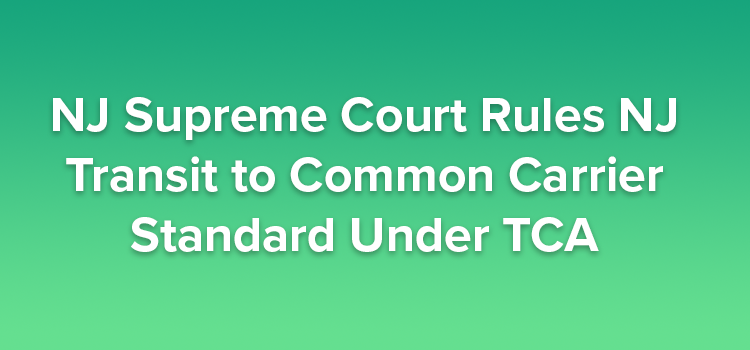
In Anasia Maison v. New Jersey Transit Corporation (A-34/35-19/083484) (Decided February 17, 2021), the Supreme Court of New Jersey held that New Jersey Transit Corporation (NJ Transit) and its bus drivers are held to the same negligence standard under the Tort Claims Act (TCA) as other common carriers, which is to exercise the utmost caution to protect their passengers as would a very careful and prudent person under similar circumstances.
Facts of Maison v. New Jersey Transit Corporation
In July 2013, Plaintiff Anasia Maison, a 20-year-old college student, boarded an NJ Transit bus operated by defendant Kelvin Coats and took a seat towards the rear of the bus. During the ride, a group of four to five teenagers verbally and physically harassed her as the bus driver silently watched and drove on. Despite the escalating threats and unruly behavior toward Maison, the bus driver did not call out the teenagers, stop the bus, or contact NJ Transit or the police. As one of the teenagers disembarked, he threw a bottle striking Maison in the forehead, causing a permanent and serious injury.
Coats testified that he knew that there was a threat to Maison. He acknowledged that his job was to get his passengers “from point A to B safely” but also stated in his deposition testimony that “it’s not my job to get involved.” After Maison was struck, he followed NJ Transit’s procedure and pushed a button to call NJ Transit’s control center. Coats waited for about fifteen minutes before the control center returned his call. The control center then contacted the police and emergency medical services. Coats admitted that he monitored the situation in the rear of the bus and that he did not stop the bus, tell the young men to “knock it off,” call the police, or contact NJ Transit’s control center until after Maison was hit with the bottle. The police never apprehended the young men who assaulted Maison.
Maison filed a complaint alleging that NJ Transit and Coats breached their common-carrier duty to protect her from the wrongful acts of co-passengers and that, as a result of their negligence, she sustained severe and permanent injuries. The trial court determined that, as a matter of law, the common-carrier standard of care applied to defendants; TCA immunities did not shield defendants from liability; and comparative fault could not be allocated to the unidentified bottle thrower. The jury returned a liability verdict against defendants and awarded Maison $1,800,000.
The Appellate Division affirmed as to the common-carrier standard and the lack of immunity, but it found that the trial court erred in not submitting to the jury the decision whether to allocate fault between the intentional tortfeasor — the bottle thrower — and defendants. It did not disturb the damages award and remanded for a new trial at which a jury would determine what percentage of fault, if any, should be allocated to the bottle thrower.
NJ Supreme Court’s Decision in Maison v. New Jersey Transit Corporation
The New Jersey Supreme Court affirmed and modified the judgment of the Appellate Division. Most notably, the court concluded that NJ Transit and its bus drivers are held to the same negligence standard under the TCA as other common carriers.
As highlighted by the New Jersey Supreme Court, the TCA directs that liability is to be imposed on public entities for the acts or omissions of their employees “in the same manner and to the same extent as . . . private individual[s] under like circumstances,” and on public employees “to the same extent as . . . private person[s].” According to the court, that directive strongly implies that similarly situated public common carriers and private common carriers are not to be treated in a different manner or to a different extent for liability purposes. In further support, the court cited that a number of other jurisdictions hold public entities to the same heightened common-carrier standard as private carriers.
The New Jersey Supreme Court also emphasized that a passenger’s expectation of safety on a bus does not vary depending on who owns the carrier. “We cannot conclude that the Legislature intended that the tens of thousands of people in New Jersey who daily rely on public transportation would not have similar protections as those who travel on vehicles owned by private carriers,” the court wrote.
The New Jersey Supreme Court next addressed whether NJ Transit and the defendant bus driver are shielded from liability by any of the three TCA immunities they invoked. It held that defendants are not shielded from liability by the TCA immunities of failure to provide police protection, N.J.S.A. 59:5-4; failure to enforce a law, N.J.S.A. 59:2-4, :3-5; and good-faith enforcement of a law, N.J.S.A. 59:3-3. According to the court, none of those immunities abrogated defendants’ common-carrier duty to protect Maison from the dangerous and threatening conduct of the teenage passengers.
Lastly, the New Jersey Supreme Court considered whether comparative fault could be allocated to the unidentified teen who threw the bottle that struck Maison in the forehead while on the bus. The court disagreed with the Appellate Division’s conclusion that the jury may decide that, because defendants’ duty of care to their passengers encompasses their duty to protect Maison from the wrongful conduct of other passengers, no allocation of fault is necessarily required. According to the New Jersey Supreme Court, the TCA leaves no doubt that an allocation of fault between a negligent public entity and its employee and an intentional tortfeasor is mandated. Nevertheless, to ensure that defendants’ duty to protect their passenger is not unfairly diluted or diminished, the trial court must give the jury clear guidance on the factors to consider in allocating degrees of fault.
The New Jersey Supreme Court remanded for a new trial on allocation of fault consistent with its opinion.
